2019-2020年高中英语译林版选修七教学案:Unit 2 单元小结(含答案)
牛津译林版高中英语选修模块七-牛津英语模块七Unit2-Reading教案-新版
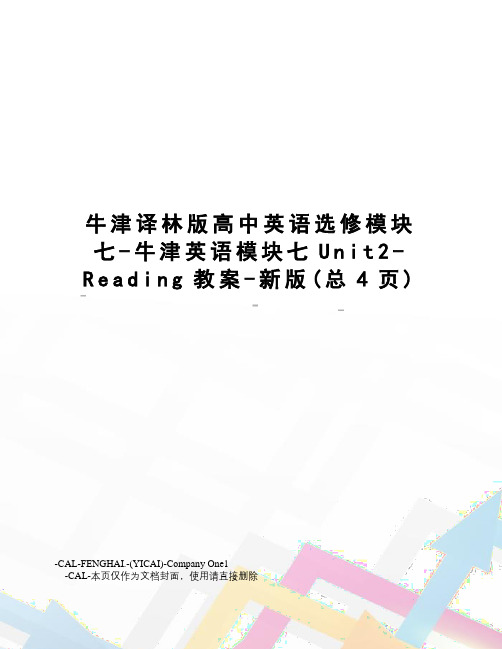
牛津译林版高中英语选修模块七-牛津英语模块七U n i t2-R e a d i n g教案-新版(总4页) -CAL-FENGHAI.-(YICAI)-Company One1-CAL-本页仅作为文档封面,使用请直接删除牛津英语模块七Unit2 Reading教案Step 1: Lead-inHave you ever taken medicines What medicines have you ever taken And what do you know about themPlease talk about your own experiences with medicines.Step 2: Fast reading for general ideasGo through the passage as quickly as possible and try to find answers to the three questions in part A on Page 18. Pay attention to the title so that you can identify the most important information as soon as possible.AnswersA 1. Aspirin and penicillin.2. In 1900.3. The Nobel Prize.Step 3: Detailed reading for important information1. Read the passage a second time and complete Part C1 and Part C2.AnswersC1 1. About 2,500 years ago.2. In 1897.3. It can also help reduce the risk of heart attacks by thinning blood, prevent a stroke, reduce the risk of colon cancer, increase the length of people’s lives and help with diabetes.4. In the mould that killed bacteria.2. Read the article again and fill in the form below so that you can understand the use of the two medicines introduced in the article.3. Pay attention to the medical terms in the reading passage. Underline the words and put them in correct categories.Step 4: Practice:1. Complete Part D. You may refer to the reading passage on pages 18 and 19 for some help.2. Part E i s about two entries in a children’s encyclopedia, one about aspirin and the other about penicillin. Please finish it.Step 5: Post-reading activities1. You will be divided into groups of four to introduce the development of aspirin and penicillin to other group members with the help of the timeline in Part C2.2. Search for more information about the scientists who have invented aspirin and penicillin. Give a brief introduction of the scientists.3. Read the instructions for Part F and discuss the questions listed.Step 6: Language points:Step 7: HomeworkPart A on page 114 and Part B on page 115 of the Workbook.。
英语译林牛津版选修7Unit2学案(重点词汇讲解2).docx
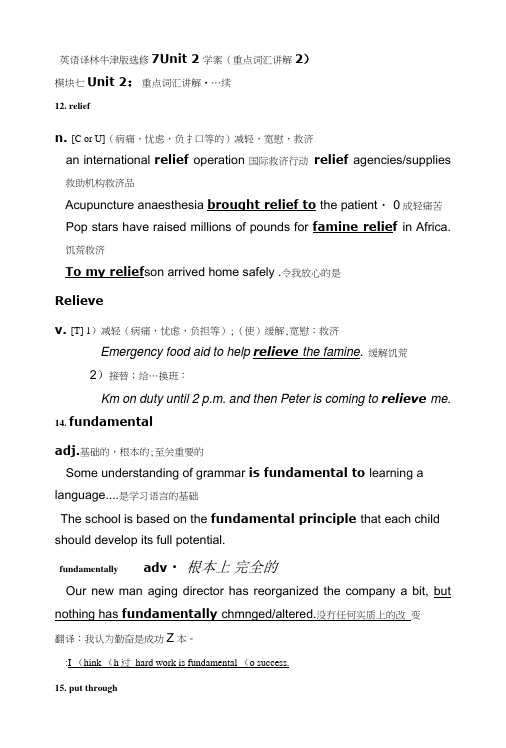
英语译林牛津版选修7Unit 2学案(重点词汇讲解2)模块七Unit 2:重点词汇讲解•…续12. reliefn. [C or U](病痛,忧虑,负扌口等的)减轻,宽慰,救济an international relief operation 国际救济行动relief agencies/supplies 救助机构救济品Acupuncture anaesthesia brought relief to the patient・ 0成轻痛苦Pop stars have raised millions of pounds for famine relief in Africa.饥荒救济To my relief son arrived home safely .令我放心的是Relievev. [T] 1)减轻(病痛,忧虑,负担等);(使)缓解,宽慰;救济Emergency food aid to help relieve the famine.缓解饥荒2)接替;给…换班:Km on duty until 2 p.m. and then Peter is coming to relieve me.14. fundamentaladj.基础的,根本的;至关重要的Some understanding of grammar is fundamental to learning a language....是学习语言的基础The school is based on the fundamental principle that each child should develop its full potential.fundamentally adv・根本上完全的Our new man aging director has reorganized the company a bit, but nothing has fundamentally chmnged/altered.没冇任何实质上的改变翻译:我认为勤奋是成功Z本。
高中英语Unit2FitforlifeSectionⅡLanguagePointsⅠ教案含解析牛津译林版选修7

Section ⅡLanguage Points (Ⅰ) (Welcome to the unit & Reading)Ⅰ.单词拼写根据汉语或首字母提示,写出下列单词1.They thought his behavior was abnormal (反常的).2.She has the potential (可能性) to become a worldclass pianist.3.Used wisely,online games will become effective (有效的) teaching tools.4.The rise in inflation was just one symptom (征兆) of the poor state of the economy.5.The driver stepped on the gas and accelerated (加速) the car.6.Laidoff workers cannot afford to purchase medicines from a chemist when they get sick,nor do their children keep a healthy diet.7.As we know,Japan has long promised never to make or possess nuclear weapons.8.Good financial accounts are vital to the success of any enterprise.9.As we all know,the industrial revolution took place in England first.10.People bite food,chew it and swallow before it is digested.Ⅱ.拓展词汇根据词性和汉语提示,写出下列单词1.able adj.能够,可以→unable adj.不能,无法2.approve v.批准;赞成→approval n.批准,通过;赞成,同意3.normal adj.正常的→abnormal adj.不正常的,反常的4.effect n.效果,作用→effective adj.有效的;实际的,事实上的;生效的5.apply v.应用;申请→application n.应用,运用;申请,申请表;涂抹,外敷→applicant n.申请者6.benefit n.利益,好处 vt.对……有利,有益于→beneficial adj.有益的,有用的[寻规律巧记忆]根据提示补全下列短语1.focus on 集中于2.open up 打开;开拓;开业3.in the form of 以……形式4.carry out 执行,实施5.try out 测试,试验;参加选拔6.in large quantities 大量地7.pick out 挑选8.be related to 和……有关系,和……有联系9.figure out 弄懂,计算出10.by accident 意外地Ⅳ.选词填空选用上述短语的适当形式填空1.What should I do if I want to open up a new market?2.You have to buy them in large quantities directly from the factories.3.The program is focused on environmental protection and harmonious development in western China,so if you are interested in that topic,you may watch it tonight.4.As we know,poor educational performance is related to emotional disturbance.5.Now,the company is trying out a new way to improve the quality of the product,but they are not sure if it will succeed.[寻规律巧记忆]beneficial adj.有益的,有用的(教材P 18)Both of these medicines have saved millions of people's lives and have proved beneficial to mankind since they were invented.自从发明这两种药物以来,它们已挽救了数百万人的生命并被证实对人类有益。
英语译林牛津选修7Unit2学案4Grammar

英语译林牛津版选修7Unit 2学案(4)(Grammar)模块七Unit 2:Grammar and usage导学案M7U2 Grammar and usage【学习目标】:1. 学习动词短语的用法及区别。
2. 正确且熟练掌握和运用动词短语。
【学习重难点】: 1.学会辨别动词+副词与动词+介词的区别,正确熟练掌握动词短语的运用.2.熟练掌握并运用高考高频动词短语.教学过程: 熟练并正确运用动词短语(C级)一.短语动词的构成:英语中的动词,按其构成,可分为单词动词(single-word verb)和短语动词(phrasal verb).短语动词指由两个或两个以上单词构成的动词.这种动词主要有三种组合形式:(一) 动词+副词构成的动词短语:动词+副词构成的动词短语分为两类: “及物动词+副词”和“不及物动词+副词”. “及物动词+副词”短语的宾语既可以放在副词之前也可以放在副词之后, 但如果宾语为人称代词,则必须放在副词之前.Eg. 1. He took off his coat.2.Having worn his raincoat all the way, he took it off when he arrived at his office.3.Uncle Tom passed away (去世)many years ago.4.他进来时脱掉外套,出去时又穿上.He took off his coat when he entered the house and put it on again when he went out. (take off 是及物短语动词)5.There is often a spectators' balcony at airports, where people can watch the planes taking off and landing. (take off是不及物短语动词)6.His words puzzled me so much that I spent several minutes________________.A. making it upB. to make it upC. figured it outD. to figure it out总结:及物动词必须加宾语意思才完整的动词。
Unit2 Module7 学案 (译林牛津版高二英语选修七教案教学设计)
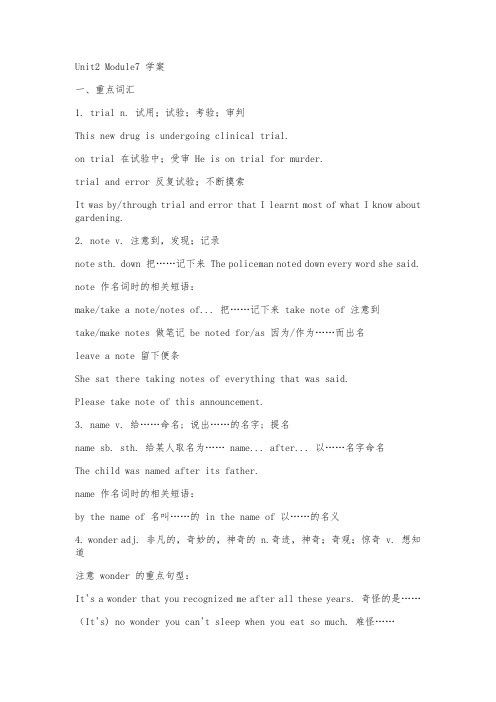
Unit2 Module7 学案一、重点词汇1. trial n. 试用;试验;考验;审判This new drug is undergoing clinical trial.on trial 在试验中;受审 He is on trial for murder.trial and error 反复试验;不断摸索It was by/through trial and error that I learnt most of what I know about gardening.2. note v. 注意到,发现;记录note sth. down 把……记下来 The policeman noted down every word she said.note 作名词时的相关短语:make/take a note/notes of... 把……记下来 take note of 注意到take/make notes 做笔记 be noted for/as 因为/作为……而出名leave a note 留下便条She sat there taking notes of everything that was said.Please take note of this announcement.3. name v. 给……命名; 说出……的名字; 提名name sb. sth. 给某人取名为…… name... after... 以……名字命名The child was named after its father.name 作名词时的相关短语:by the name of 名叫……的 in the name of 以……的名义4. wonder adj. 非凡的,奇妙的,神奇的 n.奇迹,神奇;奇观;惊奇 v. 想知道注意 wonder 的重点句型:It's a wonder that you recognized me after all these years. 奇怪的是……(It's) no wonder you can't sleep when you eat so much. 难怪……I was wondering whether/if I could borrow your car.5. relief n缓和,减轻 The pills gave her some relief.轻松,宽心 Hearing the news.,he breathed a sign of relief.救济物品,救济金 Relief was flown to the flood-hit areas.to one's (great) relief 使某人宽慰的是bring relief to sb. 给某人带来欣慰/解脱,减轻某人的痛苦relieve v. 减轻(病痛、忧虑、负担等),缓解;救济relieve pains/ anxiety/pressure/ traffic jams...relieve sb. of sth. 解除某人的负担责任等6. pleasure n.[u]愉快,高兴 He finds great pleasure in reading.[c]乐事;趣事 It is a pleasure to work with you.1) --- Thank you very much for your help.---(It's) My pleasure.2)---Could you help me with my English after school today?---With pleasure.7. point n. 点,位置;尖端;要点;分数point of view 观点on the point of 正要……的时候 She was on the point of going out when the telephone rang.to the point 中肯扼要;切中要害There is no point in doing sth. 做某事是没有用或意义的There is no point talking to her. She never listens.8. adj.life-saving 救命的 blood-thinning 稀释血液的 bacteria-killing 杀菌的二、重点难点语言点1. ASA could reduce the risk of colon cancer by 40 per cent.ASA可以降低40%的结肠癌发病率。
2018-2019学年高中英语(译林版)选修7学案:语法详解 Unit2
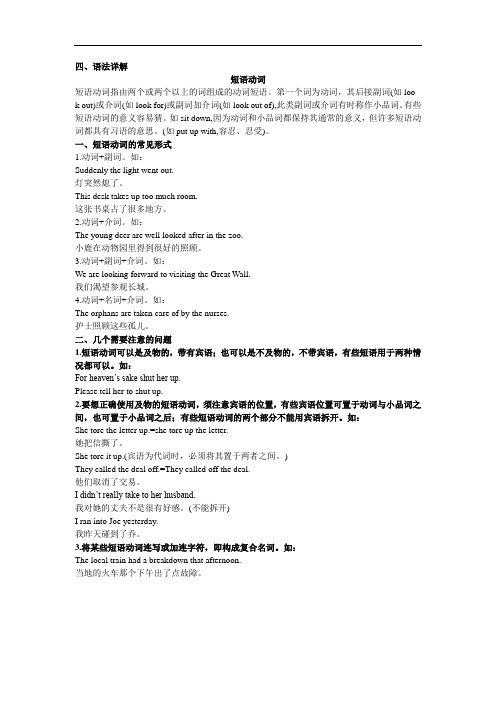
四、语法详解短语动词短语动词指由两个或两个以上的词组成的动词短语。
第一个词为动词,其后接副词(如loo k out)或介词(如look for)或副词加介词(如look out of),此类副词或介词有时称作小品词。
有些短语动词的意义容易猜。
如sit down,因为动词和小品词都保持其通常的意义,但许多短语动词都具有习语的意思。
(如put up with,容忍、忍受)。
一、短语动词的常见形式1.动词+副词。
如:Suddenly the light went out.灯突然熄了。
This desk takes up too much room.这张书桌占了很多地方。
2.动词+介词。
如:The young deer are well looked after in the zoo.小鹿在动物园里得到很好的照顾。
3.动词+副词+介词。
如:We are looking forward to visiting the Great Wall.我们渴望参观长城。
4.动词+名词+介词。
如:The orphans are taken care of by the nurses.护士照顾这些孤儿。
二、几个需要注意的问题1.短语动词可以是及物的,带有宾语;也可以是不及物的,不带宾语,有些短语用于两种情况都可以。
如:For heaven’s sake shut her up.Please tell her to shut up.2.要想正确使用及物的短语动词,须注意宾语的位置,有些宾语位置可置于动词与小品词之间,也可置于小品词之后;有些短语动词的两个部分不能用宾语拆开。
如:She tore the letter up.=she tore up the letter.她把信撕了。
She tore it up.(宾语为代词时,必须将其置于两者之间。
)They called the deal off.=They called off the deal.他们取消了交易。
英语译林牛津版选修7Unit2学案(短语动词练习及答案).docx
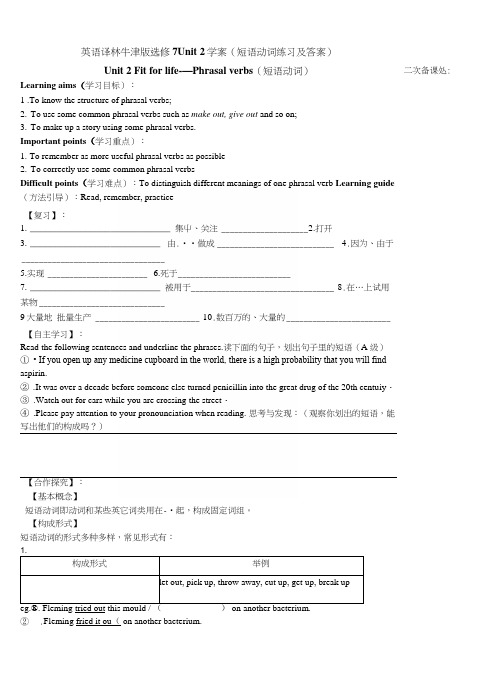
英语译林牛津版选修7Unit 2学案(短语动词练习及答案)Unit 2 Fit for life-—Phrasal verbs(短语动词)二次备课处: Learning aims(学习目标):1 .To know the structure of phrasal verbs;2.To use some common phrasal verbs such as make out, give out and so on;3.To make up a story using some phrasal verbs.Important points(学习重点):1.To remember as more useful phrasal verbs as possible2.To correctly use some common phrasal verbsDifficult points(学习难点):To distinguish different meanings of one phrasal verb Learning guide(方法引导):Read, remember, practice【复习】:1. ____________________________ 集屮、关注 ____________________2.打开3. __________________________ 由.••做成___________________________4.因为、由于_________________________________5.实现 _______________________6.死于__________________________7. __________________________ 被用于_________________________________ 8.在…上试用某物_____________________________9大量地批量生产 ________________________ 10.数百万的、大量的________________________【自主学习】:Read the following sentences and underline the phrases.读下面的句子,划出句子里的短语(A 级)①• If you open up any medicine cupboard in the world, there is a high probability that you will findaspirin.②.It was over a decade before someone else turned penicillin into the great drug of the 20th centuiy・③.Watch out for cars while you are crossing the street・④.Please pay attention to your pronounciation when reading. 思考与发现:(观察你划出的短语,能写出他们的构成吗?)【合作探究】:【基本概念】短语动词即动词和某些英它词类用在-•起,构成固定词组。
译林版高中英语选修7优化教案 Unit 2 Section Ⅴ Project

Section_ⅤProject[原文呈现] [读文清障]Magic needles: Chinese acupuncture①One of the most famous Chinese medical treatments is the art of ‘magic needles’,or Chinese acupuncture.It was developed long ago, perhaps as early as 2000 BC.There is evidence that acupuncture began during the Stone Age, when stone tools called bian (砭) were used to press areas of the body②.As acupuncture developed③,the simple bian stones were replaced by stone needles.Eventually④,metal needles began to appear and took their place⑤.There were nine different kinds of needles.These included a needle with a head like an arrow, used for making shallow⑥holes in the surface of the skin; a needle with a round tip, used for pressing the tissue under the skin; a dull⑦needle, used for tapping against pressure points⑧;and a needle like a small sword⑨,used for⑩letting liquid out⑪of body parts which had swollen up⑫.These needles could be made of⑬different metals, such as gold and silver.Some acupuncturists⑭today still use gold and silver needles, but the majority⑮use only stainless⑯steel ones.The main needle now used for acupuncture is fine⑰and sharp⑱.Most of the others have been replaced①acupuncture/'ækjʊpʌŋktʃə(r)/n.针刺疗法②There is evidence that ...有证据表明……,其中that引导同位语从句,解释说明evidence的具体内容;when引导非限制性定语从句,修饰the Stone Age;定语从句中过去分词短语called bian作stone tools的后置定语。
- 1、下载文档前请自行甄别文档内容的完整性,平台不提供额外的编辑、内容补充、找答案等附加服务。
- 2、"仅部分预览"的文档,不可在线预览部分如存在完整性等问题,可反馈申请退款(可完整预览的文档不适用该条件!)。
- 3、如文档侵犯您的权益,请联系客服反馈,我们会尽快为您处理(人工客服工作时间:9:00-18:30)。
Diabetes is a kind of sickness. Blood sugar is sohigh that the body is unable to process it. There aremany symptoms:losing weight while being hungryall the time.Diabetes does damage to manyorgans and even leads to swelling up.Treatment fordiabetes is to take insulin with a needle or sometablets.The factors that cause diabetes are complex.One theory is reasonable, saying that diabetes relates to genetics.,糖尿病是一种疾病。
血糖那么高以至于身体转化不了它。
糖尿病有许多症状,如一直饥饿,身体消瘦。
糖尿病危害很多脏器甚至引起浮肿。
对糖尿病的治疗就是用针头注射胰岛素或服药片。
糖尿病的诱因很复杂。
有个说法比较合理,说糖尿病与基因有关。
2019-2020年高中英语译林版选修七教学案:Unit 2 单元小结(含答案) Ⅰ.完形填空Whenever Christmas is drawing near, an Iowa radio station has an annual tradition. Listeners send in “wish letters”,and the hosts select some to __1__. They've been making Christmas dreams come true for more than 20 years, but they never __2__ they would receive a letter from a person who was already dead.Last week, the hosts of the station invited listener David Schmitz to their __3__,but the station didn't tell him who had sent in the __4__for his family. They read the letter to him on the __5__:“Hello, my name is Brenda Schmitz. When you receive this letter, I will have already __6__ my battle to cancer.”The big __7__ made David's eyes swim in tears.David heard three wishes from his __8__ wife. The first was to his new partner.“Thank you, I love you whoever you are.” And the second:“For my family, a wonderful __9__,with many scenic spots where they all can enjoy their companionship as a new __10__ and make memories that will be with them forever.”__11__,she wanted to give a night of food and fun to the hospital __12__ that cared for her during her __13__ days.The letter was written by Brenda two months before __14__.She prepared it and asked a friend to send it to the station once her husband fell in love __15__.“I began to know Jayne, my present wife, __16__.On a cold afternoon, I took my little son, Marx, to the __17__ where a group of seagulls were flying over his head.I didn't __18__ it until Marx burst into tears, running to Jayne and asking her to be his __19__,who was playing there with her two ter, she became Marx's new mom and she __20__ him as her ownson.Brenda will live in our hearts forever.”语篇解读:来自艾奥瓦州的一家电台每逢圣诞节都会帮助听众实现圣诞愿望。
上周,电台收到了一个与众不同的请求。
一位叫做Brenda Schmitz的女士,来信提出了三个圣诞愿望。
1.A.praise B.sendC.discuss D.broadcast解析:选D依据前文中的“radio station”和后文中的“read the letter”可知,此处应该是主持人选择其中一些信件进行广播。
2.A.thought B.foundC.remembered D.assumed解析:选A依据上下文的信息,此处是说电台的工作人员们压根儿没有想到他们会收到一位已经去世的人写给他们的信。
3.A.office B.hospitalC.show D.home解析:选C根据上下文的内容可知,电台的主持人邀请David Schmitz来做一期节目。
下文中的“They read the letter to him”是提示。
4.A.expectation B.thanksC.wish D.dream解析:选C根据上文的“send in ‘wish letters’”可知答案。
这里指工作人员没有告诉David是谁为他的家庭送来了圣诞祝福。
5.A.scene B.occasionC.vacation D.air解析:选D依据上下文的信息和常识判断,on the air“在广播中”,符合语境。
on the scene“在现场”;on the occasion“在这个场合”;on vacation“在度假”。
6.A.won B.lostC.accepted D.refused解析:选B根据上文中的“they would receive a letter from a person who was already dead”可知,Brenda Schmitz未能战胜癌症。
7.A.news B.disasterC.surprise D.enjoyment解析:选C根据上文中的“the station didn't tell him who had sent in ...”“when you receive this letter”可知,David事先对此一无所知,故surprise符合题意。
8.te B.presentC.next D.innocent解析:选A根据上下文可知,此处指David已经去世的妻子。
上文中的“dead”是提示。
9.A.trip B.holidayC.concert D.dinner解析:选A依据下文的“with many scenic spots”可知,此处指的是一次美好的旅行。
10.A.relative B.ChristmasC.family D.journey解析:选C根据最后一段中的“my present wife”“she became Marx's new mom”可知,此处表示他们作为一个新家庭享受彼此的陪伴。
11.A.Clearly B.LastlyC.Surely D.Sincerely解析:选B前面讲到David已故的妻子有三个愿望,前面已经说了两个愿望,故此处应是最后一个愿望。
12.A.staff B.doctorC.colleague D.manager解析:选A根据常识及空后的“cared for her”可知,此处指的应该是医院里的医护人员。
13.A.special B.finalC.tough D.busy解析:选B根据上下文可知,此处表达的是“在她最后的那些日子里”,故选B项。
14.A.going away B.falling downC.giving up D.passing away解析:选D依据上下文的信息和常识判断,这封信是她去世前所写的。
上文中的“dead”是提示。
15.A.twice B.againC.ever D.already解析:选B此处Brenda想表达的是一旦她丈夫再次坠入爱河,(她的朋友)就把这封信送往艾奥瓦州的这家电台。
16.A.by chance B.by mistakeC.by luck D.by choice解析:选A根据后面对他们认识过程的介绍可知,David是偶然认识Jayne的。
17.A.forest B.seasideC.grassland D.mountain解析:选B依据后文中的“a group of seagulls”可知,David应是带Marx去了海边。
18.A.predict B.imagineC.insist D.realize解析:选D此处是说David没有意识到(儿子对母爱的需求)直到儿子突然大哭起来,跑去问Jayne可否做他的妈妈。
19.A.friend B.teacherC.mother D.playmate解析:选C参见上题解析。
下文中的“new mom”是提示。
20.A.treats B.acceptsC.misses D.controls解析:选A Jayne对待Marx像对待自己的儿子一样。
Ⅱ.阅读理解It turns out that giving thanks is good for your health.And maintaining an attitude of gratitude can improve psychological, emotional and physical well-being.Adults who frequently feel grateful have more energy, more optimism, more social connections and more happiness than those who do not.They are also less likely to be depressed, envious, greedy or alcoholic.They earn more money, sleep more soundly, exercise more regularly and have greater resistance to viral infections.And gratitude brings similar benefits to children and adolescents.Kids who feel grateful and act thankfully tend to be less materialistic, get better grades, set higher goals, complain of fewer headaches and stomachaches and feel more satisfied with their friends, families and schools than those who don't.It's possible, of course, to overdo expressions of gratitude,particularly if you try to show it with a gift.Thanking someone in sucha way that is disproportionate (不成比例的) to the relationship — saya student giving her teacher an iPad — will create resentment,_angerand a sense of obligation.Gratitude can also be misused to exert (施加) control over the receiver and enforce loyalty.And you can avoid this by being empathetic with the person you are thanking — and by honestly expressing your motivations.For older children and adults, one simple way to cultivate gratitude is to literally count your blessings.Keep a journal and regularly record whatever you are grateful for that day.Be specific.Listing “my friends, my school, my dog” day after day means that “gratitude fatigue” has set in.The real benefit comes in changing how you experience the world.Look for things to be grateful for, and you will start seeing them everywhere.语篇解读:本文是一篇议论文,主要阐述了感恩会使人们身心健康,同时也要注意正确表达感恩。
